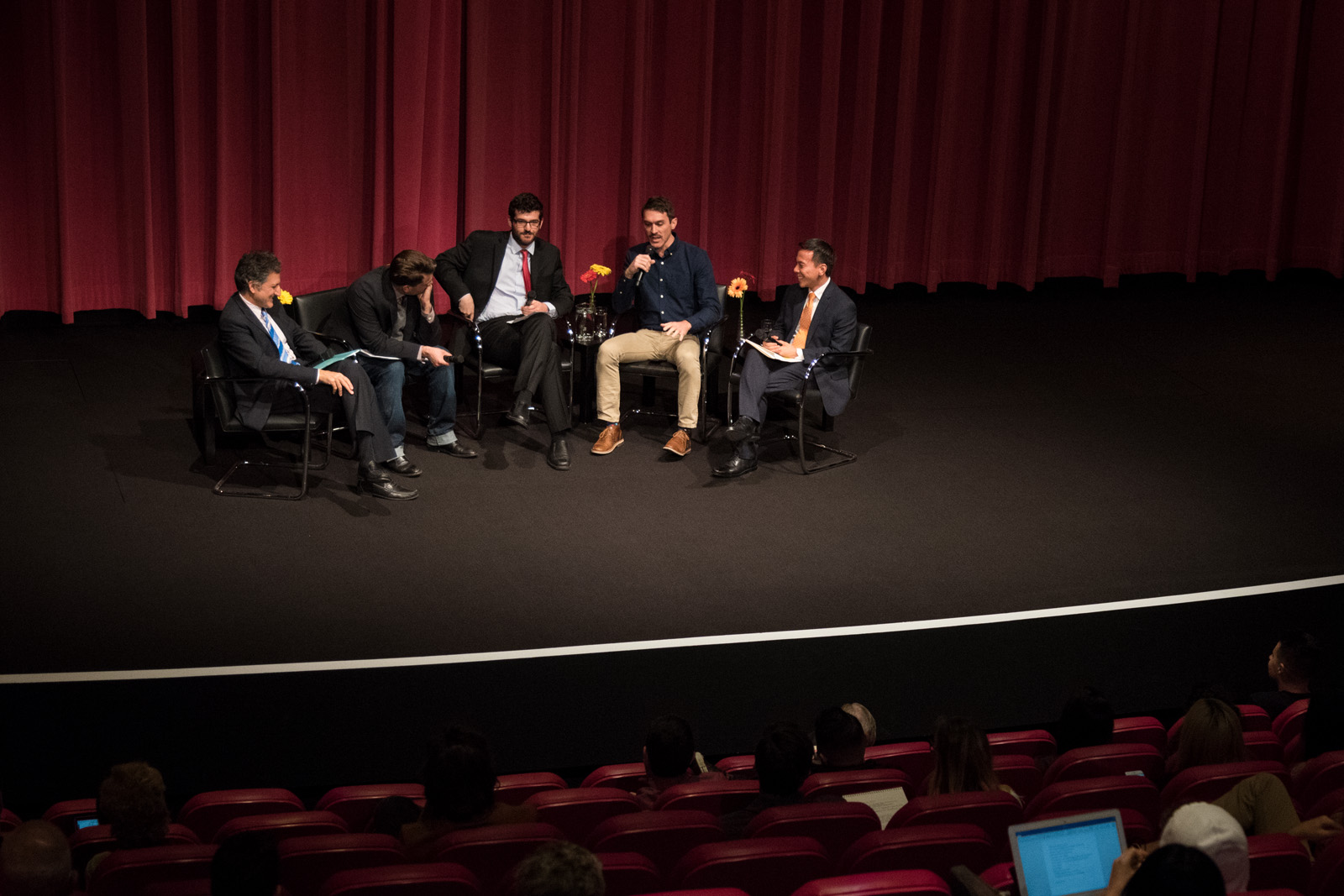Panel at Hammer Museum discusses LGBTQ rights in blood donation

Panelists at the Hammer Museum discussed the Food and Drug Administration’s ban on blood donation from men who have sex with men Tuesday. (Daniel Leibowitz/Daily Bruin)
By Xinchen Li
Nov. 25, 2016 12:37 p.m.
Members of the LGBTQ community on campus said they are frustrated with a federal policy that bans men who have sex with men from donating blood unless they are celibate for one year.
A panel of social activists, medical, media and law experts discussed Tuesday how this one-year deferral policy strengthens discrimination of the LGBTQ community. The Hammer Museum and the Williams Institute of the UCLA School of Law co-hosted the event to encourage people to participate in the public comment on the policy change, which closes on Nov. 25.
The United States Food and Drug Administration enacted a permanent blood donation ban on men who have sex with men, or MSM, in 1983 to prevent transmission of diseases, such as HIV, through blood transfusions.
According to the policy, MSM includes men who have sexual interaction with members of the same sex, regardless of their sexual orientation. MSM usually refer to gay and bisexual men, but some states’ policies also classify transwomen as MSM.
The FDA changed the policy in December 2015 to allow MSM to donate if they have not had sexual intercourse with another man within a year.
“In fact, it is hard for most adults to be celibate for a year,” said Mark Joseph Stern, a writer and the moderator of the panel. “The general read of the new policy is a lifetime ban, only phrased in a different way.”
The FDA adopted the one-year deferral policy because there is about a seven-day long window period in blood testing, during which a person can be infected with HIV but still test HIV negative during this period, said Jeffrey Klausner, professor of epidemiology and public health at the David Geffen School of Medicine at UCLA.
Klausner said medical researchers have increased the accuracy of blood testing since the 1980s. The risk of inadvertently transmitting HIV through blood donation is now as low as roughly one in 1.5 million units of blood, he said.
The FDA revised its original policy because new technology made it easier to detect HIV infection of the blood, MSM are less likely to transmit HIV through the blood they donate, Stern said. But the one-year deferral is still too long compared to the average length of the window period.
LGBTQ student groups on campus have advocated for a complete lift of the ban, said Raja Bhattar, the director of the UCLA LGBTQ Resource Center.
The Lavender Health Alliance, for example, held a blood drive with the UCLA Blood and Platelet Center last spring to campaign for MSM’s right to donate blood, Bhattar said. The organization advocates for LGBTQ health care rights and provides medical mentorship for LGBTQ students.
The ban was still permanent when the organization held the drive last year, so it only included eligible donors who donated on behalf of the LGBTQ community, said Austin Beltrand, president of the Lavender Health Alliance and a fourth-year neuroscience and philosophy student.
Beltrand said the ban was justifiable in the 1980s, when HIV infection was more likely among MSM and the testing technology was poor. But the current policy seems less fair because many LGBTQ people have sexual protection options and tend to have monogamous relationships, he said.
Brad Sears, executive director of the Williams Institute at UCLA School of Law, said the ban also prevents LGBTQ people from fully engaging in their community.
“When one tries to contribute to their community, school or workplace, one should be able to contribute as a full self, not need to hide any part of him or her,” Sears said.
Some LGBTQ faculty members on campus are also upset that they are not able to donate like their colleagues, Bhattar said.
UCLA allows employers to take compensatory time off after donating blood to the UCLA Blood and Platelet Center, Bhattar said. But gay and bisexual faculty members cannot participate.
“Banning gay and bisexual staff from donating blood means they cannot enjoy the benefits like the other staff members do,” Bhattar said.
In the future, the FDA could adopt an individualized screening of blood donors, Klausner said. The screening would ensure every donor’s blood is qualified through testing, instead of entirely banning any group of people from donating.
An individualized screening is more effective in minimizing transmission of a wider spectrum of diseases, including Hepatitis B and C, and it would not exclude any specific community from blood donation, Klausner said.
“We should judge people upon what they do, not who they are,” said Kelsey Louie, a panelist at the Hammer museum event and CEO of the Gay Men’s Health Crisis. The Gay Men’s Health Crisis is an organization that educates people on how to prevent HIV, and advocates for HIV patients’ right to be treated as normal.
Allowing MSM to donate would also contribute to the total amount of blood donation, Sears said. Research from the Williams Institute indicates patients would gain an estimated 615,300 additional pints of blood each year if the FDA lifts the current ban on MSM donation.
The UCLA Blood and Platelet Center has collaborated with LGBTQ organizations on campus, such as Lavender Health Alliance, to include more donors, said Alyssa Ziman, medical director of clinical laboratories at the UCLA Ronald Reagan Medical Center. She said she thinks there are ways to include more donation while protecting the safety of the patients.
“We would like to partner and support with these organizations as much as we hope they can partner and support us, as well as the UCLA patients,” Ziman said.


